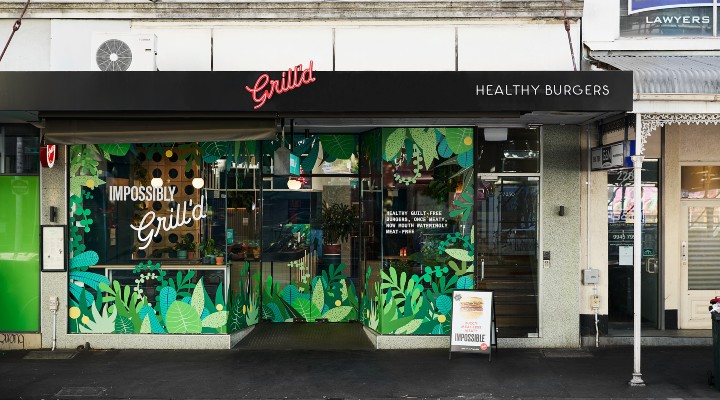Last week, fast-food chain Grill’d launched two restaurants that serve only plant-based burgers – called Impossibly Grill’d. These stores, located on Crown Street, Sydney, and Collingwood, Melbourne, are touted as a top-to-toe revamp of the traditional Grill’d restaurant, and offer a menu made up of 23 plant-based burgers, as well as salads and sides. And, while Impossibly Grill’d has launched with only two stores (which are operating as a trial for three months) there are
e are likely to be more on the horizon.
“We know that plant-based alternatives will play a huge role in the future of burgers, and we want to lead the way,” a Grill’d spokesperson told Inside Retail. “There’s a migration to alternative food choices, with plant-based food being a permanent trend. This initiative is part of our commitment to be a progressive and inclusive brand catering for all food tribes, whatever their food preference.”
Grill’d says the business’s plant-based burgers started out representing around 5 per cent of total sales, but in the past few years this has grown to make up 15 per cent of the chain’s overall business.
More demand, better choices
The commitment Grill’d and other players in the quick service restaurant (QSR) scene have shown showcases a growing trend of more and more people wanting plant-based options.
McDonald’s launched its McPlant in 2020, using a Beyond Meat patty, while KFC launched a plant-based chicken burger in 2019. Meanwhile Mad Mex launched Meat-Free Mondays last year.
“Our goal is to see 30 per cent of our menu sales being vegetarian or vegan by the end of 2023. It’s important to us because we have kids and we want them to enjoy the planet. It’s important because we want to make it easier for people to make that choice,” Mad Mex CEO Clovis Young told Inside Retail last year. “It’s not an ethical position around animal rights, it’s a moral position, we have to help people make better choices that are good for the environment.”
Much of this uptake has been due to the rapid improvement of quality in plant-based options, ethical consumer expert Peta Granger told Inside Retail.
“The quality of plant-based meats has improved so much over the last five years, fooling many meat eaters, and increasing the amount of people willing to give it a go,” Granger said.
“Research shows that curiosity motivates most people, who are often surprised by the impressive meat-like texture and flavour – and the numerous environmental, ethical and health benefits later influence plant-based decisions as a more conscious choice.”
Granger says that as more players in the QSR industry make plant-based options accessible, the trend of shoppers trying, and enjoying, plant-based meals will continue to grow – further fuelling an already booming industry.
“Delicious vegan fast food pushing its way into the mainstream is an incredible prospect to contemplate,” Granger said. “It’s the kind of consumer transition needed as climate action reaches such a critical period in the coming decade.”
A recent report in Nature Food stated that a third of all planet-heating gas emissions come from the production of food, with meat production emitting twice as much as the creation of plant-based alternatives.
“It’s another example of business models, like the fast-food industry, making wise economic transitions long before our current political leaders,” Granger noted.
However, not everyone is excited about the increasing relevance of plant-based options. In 2021, the Australian seafood, meat, and poultry industries commissioned a survey that found 75 per cent of respondents said it shouldn’t be legal for plant-based products to use meat descriptors to market their food – for example, calling a product ‘plant-based chicken’.
“They have tried to ban the plant-based industry from using words like ‘meat’, ‘beef’ and ‘chicken’ in their labelling, which was, thankfully, rejected by the ACCC,” Granger said.
“They’ve since lobbied the federal government to launch a Senate inquiry into the matter.”
Tapping into a growing market
Plant-based initiatives aren’t just a way to build out a more inclusive menu. They’re about tapping into a growing market of vegan, vegetarian, and flexitarian consumers who are increasingly looking for options outside of the traditional beef, chicken, and fish.
Globally, vegans and vegetarians constitute a small number of consumers, at only 4 per cent and 6.4 per cent respectively, a report from Euromonitor found. But what’s driving the plant-based boom is a growing number of consumers who are restricting their consumption of animal-based products without following a strict vegan or vegetarian diet, explained Allen Zelden, founder of Intrinity Global and president of digital eco-conscious website Futurevvorld.
“Australia is seen as the most flexitarian region, with 45 per cent of consumers actively reducing their animal product intake,” Zelden said.
And with Australia’s supermarket duopoly controlling the majority of the local grocery sector, many independent plant-based food businesses are looking at QSR and other food services as a way into the stomachs of consumers, particularly as pandemic restrictions ease and Australians feel more comfortable eating out again.
“In the USA, the food service channel has been a key contributor to the success behind many of the most prominent global plant-based food businesses,” Zelden said. “Beyond Meat’s exposure to food service businesses was an instrumental growth driver for them, with half of their overall net revenue reportedly coming from food service sales in 2019.
“I’m confident that we’ll see many more meat-heavy menus throughout Australia embrace greater plant-based options in 2022 and beyond.”

